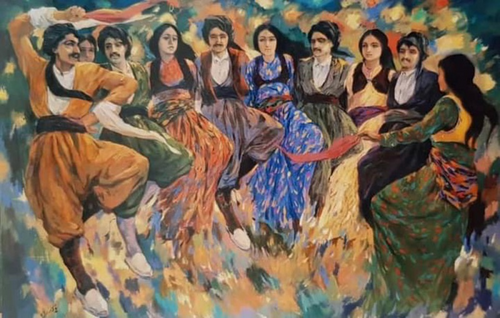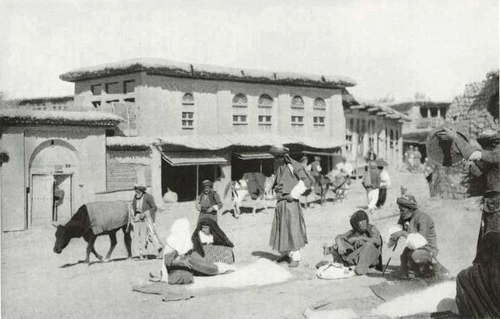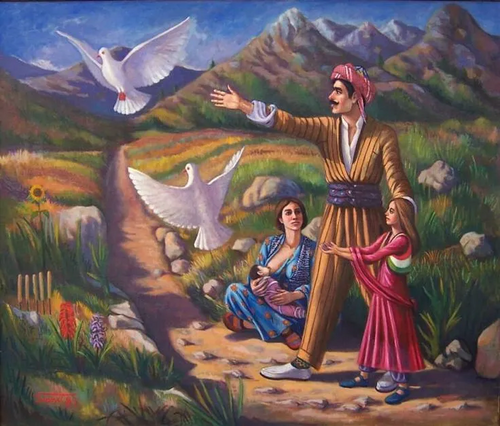Because the Kurdish people have been a stable and established nation in the Middle East, they have always been very rich in terms of history, civilization, folklore, etc.
The Kurdish nation has always been proud of its rich folklore and honestly, other nations have also talked about the richness of Kurdish folklore. However, some of the occupying nations have tried to steal Kurdish folklore.
Therefore, we need to know the definition of the word folklore and where this word comes from. Then we will come to Kurdish folklore and see how much it affects nation-building.

Folklore is not a very old concept, but its content is; Folklore is a word derived from "fol" meaning "people" and "lore" meaning "science", meaning "the culture of the people". For the first time, the word "folklore" was published in 1846 by a British writer named William John Thoms in the journal Athenaeum. This word has been used in the informal literature.
"From now on, use the word 'folklore' instead of 'custom'," he wrote in a letter to the Athenians.
According to William John Thoms, folklore includes actions, myths, stories, imagination, proverbs, magic, oral literature, and all old things. Now the word folklore is gradually making its way into society.
In another definition, UNESCO defines folklore as follows: Folklore is a collection of human intellectual works that distinguish one society from another and includes some subjects such as stories, poetry, literature, paintings, artistic sites, musical instruments, historic works and crafts, location, and construction.
Among the Kurdish people, folklore is defined as oral literature such as Hayran, Lawk, Hora, Siawchamana, proverbs, riddles, stories, musical instruments, old household items, novels, mothers' lullabies, etc.

Folklore is a source of narrative and its creators are unknown. This is one of the clearest definitions of folklore whose creator is unknown.
Through folklore, information about the values of nations is acquired and folklore is a unique treasure trove of literary expression and one of the best ways to know and interpret a nation.
The Kurdish nation is one of the nations that has ancient folklore and is very rich in terms of culture, literature, clothing, music, proverbs, poetry, dances, songs, food, and drink.
We can say that the folklore of the Kurdish nation is the rich source of the entire folklore of the Middle East because the Kurds were the first nation to settle on their own territory. In fact, the Kurds were not immigrants, they did not come from other regions, because the Kurds were the first nation to settle in their land. In fact, they were not immigrants or coming from another region because they are the first nation settled in the Zagros. Civilization is not created by immigrants because they do not have civilization, culture, or infrastructure. If a person settles in a place, they should, first of all, think of building a building or a place to live. If one builds a home, then thinks of livestock and agriculture. One of the things that the settled nation needs is culture, literature, and civilization. Therefore, the whole world knows very well that the first stable nation in the Zagros is the Kurdish nation; we have the richest literature, culture, and folklore. In fact, Kurdish folklore is like a vast and bottomless sea.

One of the foundations of Kurdish nationalism is folklore. Nations are known by folklore. The weapon of defense of any nation is folklore and people can protect their nation through the weapon.
Folklore has a great influence on nation-building and patriotism. Folklore is like a mirror and the nation is reflected in it. If we look at Kurdish folk tales, Lawk, Hayrans, and stories, we see that most of them are based on prominent Kurdish heroes and their war with the invaders and hundreds of other examples who fought for their nation. Or if you look at Kurdish folk dances, you will see that these Kurdish dances are full of symbols and triumphs. Kurdish folk songs speak to us in the language of dance and tell us about ancient events.
Although the Kurdish invaders have tried to occupy Kurdistan territory, they have also tried to steal Kurdish folklore and make it their property. The invaders of Kurdistan have gradually stolen and occupied everything, from language to musical instruments, Kurdish stories, and hundreds of other Kurdish folklore items.

The reason for the weakening and disintegration of Kurdish folklore is the lack of Kurdish ownership of its folklore.
Therefore, Kurdish intellectuals, writers, and researchers have a very important role in the process of developing folklore and preventing the assimilation of folklore and can develop folklore; Also, they can prevent its destruction by building centers and writing books. Because the main task of preserving folklore is the responsibility of researchers and authors.
Let those in power and people who love folklore and are able to follow it, work on folklore and promote it. If we fail to preserve our folklore, the invaders of Kurdistan will assimilate it, and we will see that we have no such thing as folklore for a while.
As mentioned above, folklore has an important influence on the process of nation-building and it is folklore that defines us as a nation, so it is the duty of all of us to protect it.









